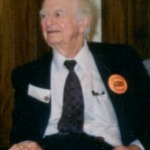Interviewer: Thomas Hager
Interview Date: February 11, 1992
Location: Interview conducted over telephone
Duration: 1:03:35
Pauling begins the interview by discussing his trip to Africa in 1959, during which he spent time with Albert Schweitzer. He comments on his interactions with Schweitzer, which included discussions about the peace process, nuclear testing, and Schweitzer’s religious views.
Pauling then discusses an incident in which he got stuck out on a ledge and was unable to move to crawl to safety. This experience, compounded with growing pressures related to his political activities, health issues, and other stressors, caused a short-term breakdown in his health.
The interview then turns to Pauling’s understanding of atoms and molecules and how visualizations and physical models aided his scientific research. Pauling discusses various models he’s developed in the past and describes how he visualizes electrons. He then discusses a few books he’d recently read. A line from one of those books leads into a conversation about Pauling and his relationship with A.A. Noyes. While Noyes seems to have considered Pauling to be his protégé, Pauling did not view it that way.
Pauling explains that he became very self-confident after entering graduate school and did not seek help from others to advance his career. Pauling describes himself as a conformist, and he and the interviewer discuss facets of his life that support that claim. It was only in his political activities following World War II that Pauling notes himself as a non-conformist. The interview concludes with a discussion of Pauling’s views on Vitamin C and the medications he was taking to treat his prostate cancer.
Dublin Core
Title
Description
Pauling then discusses an incident in which he got stuck out on a ledge and was unable to move to crawl to safety. This experience, compounded with growing pressures related to his political activities, health issues, and other stressors, caused a short-term breakdown in his health.
The interview then turns to Pauling’s understanding of atoms and molecules and how visualizations and physical models aided his scientific research. Pauling discusses various models he’s developed in the past and describes how he visualizes electrons. He then discusses a few books he’d recently read. A line from one of those books leads into a conversation about Pauling and his relationship with A.A. Noyes. While Noyes seems to have considered Pauling to be his protégé, Pauling did not view it that way.
Pauling explains that he became very self-confident after entering graduate school and did not seek help from others to advance his career. Pauling describes himself as a conformist, and he and the interviewer discuss facets of his life that support that claim. It was only in his political activities following World War II that Pauling notes himself as a non-conformist. The interview concludes with a discussion of Pauling’s views on Vitamin C and the medications he was taking to treat his prostate cancer.

